42 have author last names that start with K have author last names that start with K
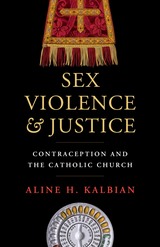
In 1968, Pope Paul VI published Humanae vitae, the encyclical that reaffirmed the Catholic Church’s continued opposition to the use of any form of artificial contraception. In Sex, Violence, and Justice: Contraception and the Catholic Church, Aline Kalbian outlines the Church’s position against artificial contraception as principally rooted in three biblical commandments. In addition, Kalbian shows how discourses about sexuality, both in the Church and in culture, are often tied to discourses of violence, harm and social injustice. These ties reveal that sexual ethics is never just about sex; it is about the vulnerability of the human body and the challenges humans face in trying to maintain just and loving relationships.
As Kalbian explores and contrasts the Catholic Church’s stance toward condoms and HIV/AIDS, emergency contraception in cases of rape, and contraception and population control, she underscores how contraception is not just a private decision, but a deeply social, cultural, and political one, with profound global implications. Kalbian concludes that even the most tradition-bound communities rely on justificatory schemes that are fluid and diverse. Taking this diversity seriously helps us to understand how religious traditions change and develop.
Sex, Violence, and Justice will be of interest to students and scholars of Catholic moral theology, sexual ethics, religion and society, gender and religion, as well as to specialists and practitioners in public health.
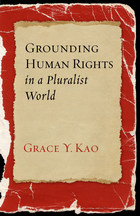
In 1948 the General Assembly of the United Nations adopted the Universal Declaration of Human Rights which declared that every human being, without “distinction of any kind,” possesses a set of morally authoritative rights and fundamental freedoms that ought to be socially guaranteed. Since that time, human rights have arguably become the cross-cultural moral concept and evaluative tool to measure the performance—and even legitimacy—of domestic regimes. Yet questions remain that challenge their universal validity and theoretical bases.
Some theorists are ”maximalist” in their insistence that human rights must be grounded religiously, while an opposing camp attempts to justify these rights in “minimalist” fashion without any necessary recourse to religion, metaphysics, or essentialism. In Grounding Human Rights in a Pluralist World, Grace Kao critically examines the strengths and weaknesses of these contending interpretations while also exploring the political liberalism of John Rawls and the Capability Approach as proposed by economist Amartya Sen and philosopher Martha Nussbaum.
By retrieving insights from a variety of approaches, Kao defends an account of human rights that straddles the minimalist–maximalist divide, one that links human rights to a conception of our common humanity and to the notion that ethical realism gives the most satisfying account of our commitment to the equal moral worth of all human beings.

Jan Karski’s Story of a Secret State stands as one of the most poignant and inspiring memoirs of World War II and the Holocaust. With elements of a spy thriller, documenting his experiences in the Polish Underground, and as one of the first accounts of the systematic slaughter of the Jews by the German Nazis, this volume is a remarkable testimony of one man’s courage and a nation’s struggle for resistance against overwhelming oppression.
Karski was a brilliant young diplomat when war broke out in 1939 with Hitler’s invasion of Poland. Taken prisoner by the Soviet Red Army, which had simultaneously invaded from the East, Karski narrowly escaped the subsequent Katyn Forest Massacre. He became a member of the Polish Underground, the most significant resistance movement in occupied Europe, acting as a liaison and courier between the Underground and the Polish government-in-exile. He was twice smuggled into the Warsaw Ghetto, and entered the Nazi’s Izbica transit camp disguised as a guard, witnessing first-hand the horrors of the Holocaust.
Karski’s courage and testimony, conveyed in a breathtaking manner in Story of a Secret State, offer the narrative of one of the world’s greatest eyewitnesses and an inspiration for all of humanity, emboldening each of us to rise to the challenge of standing up against evil and for human rights. This definitive edition—which includes a foreword by Madeleine Albright, a biographical essay by Yale historian Timothy Snyder, an afterword by Zbigniew Brzezinski, previously unpublished photos, notes, further reading, and a glossary—is an apt legacy for this hero of conscience during the most fraught and fragile moment in modern history.

Just what is a human being? Who counts? The answers to these questions are crucial when one is faced with the ethical issue of taking human life. In this affirmation of the intrinsic personal dignity and inviolability of every human individual, John Kavanaugh, S. J., denies that it can ever be moral to intentionally kill another.
Today in every corner of the world men and women are willing to kill others in the name of "realism" and under the guise of race, class, quality of life, sex, property, nationalism, security, or religion. We justify these killings by either excluding certain humans from our definition of personhood or by invoking a greater good or more pressing value.
Kavanaugh contends that neither alternative is acceptable. He formulates an ethics that opposes the intentional killing not only of medically "marginal" humans but also of depersonalized or criminalized enemies. Offering a philosophy of the person that embraces the undeveloped, the wounded, and the dying, he proposes ways to recover a personal ethical stance in a global society that increasingly devalues the individual.
Kavanaugh discusses the work of a range of philosophers, artists, and activists from Richard Rorty and Søren Kierkegaard to Albert Camus and Woody Allen, from Mother Teresa to Jack Kevorkian. His approach is in stark contrast to that of writer Peter Singer and others who believe that not all human life has intrinsic moral worth. It will challenge philosophers, students of ethics, and anyone concerned about the depersonalization of contemporary life.
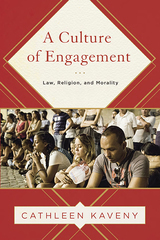
Religious traditions in the United States are characterized by ongoing tension between assimilation to the broader culture, as typified by mainline Protestant churches, and defiant rejection of cultural incursions, as witnessed by more sectarian movements such as Mormonism and Hassidism. However, legal theorist and Catholic theologian Cathleen Kaveny contends there is a third possibility—a culture of engagement—that accommodates and respects tradition. It also recognizes the need to interact with culture to remain relevant and to offer critiques of social, political, legal, and economic practices.
Kaveny suggests that rather than avoid the crisscross of the religious and secular spheres of life, we should use this conflict as an opportunity to come together and to encounter, challenge, contribute to, and correct one another. Focusing on five broad areas of interest—Law as a Teacher, Religious Liberty and Its Limits, Conversations about Culture, Conversations about Belief, and Cases and Controversies—Kaveny demonstrates how thoughtful and purposeful engagement can contribute to rich, constructive, and difficult discussions between moral and cultural traditions.
This provocative collection of Kaveny's articles from Commonweal magazine, substantially revised and updated from their initial publication, provides astonishing insight into a range of hot-button issues like abortion, assisted suicide, government-sponsored torture, contraception, the Ashley Treatment, capital punishment, and the role of religious faith in a pluralistic society. At turns masterful and inspirational, A Culture of Engagement is a welcome reminder of what can be gained when a diversity of experiences and beliefs is brought to bear on American public life.
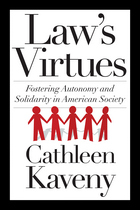
Can the law promote moral values even in pluralistic societies such as the United States? Drawing upon important federal legislation such as the Americans with Disabilities Act, legal scholar and moral theologian Cathleen Kaveny argues that it can. In conversation with thinkers as diverse as Thomas Aquinas, Pope John Paul II, and Joseph Raz, she argues that the law rightly promotes the values of autonomy and solidarity. At the same time, she cautions that wise lawmakers will not enact mandates that are too far out of step with the lived moral values of the actual community.
According to Kaveny, the law is best understood as a moral teacher encouraging people to act virtuously, rather than a police officer requiring them to do so. In Law’s Virtues Kaveny expertly applies this theoretical framework to the controversial moral-legal issues of abortion, genetics, and euthanasia. In addition, she proposes a moral analysis of the act of voting, in dialogue with the election guides issued by the US bishops. Moving beyond the culture wars, this bold and provocative volume proposes a vision of the relationship of law and morality that is realistic without being relativistic and optimistic without being utopian.

This appraisal of two of the most fundamental terms in the moral language of Thomas Aquinas draws on the contemporary moral distinction between the goodness of a person and the rightness of a person's living. Keenan thus finds that Aquinas's earlier writings do not permit the possibility of such a distinction. But in his mature works, specifically the Summa Theologiae, Thomas describes the human act of moral intentionality, and even the virtues in a way analogous to our use of the term moral rightness. To Thomas, only the virtue of charity expresses moral goodness. And, although Thomas describes vices and sin as wrong conduct, he never really develops a description for moral badness.Keenan compels us to carefully examine Thomas's central moral concepts and to measure them against contemporary standards for meaning and correctness. As a result, any student of Thomas will find here a forceful argument that his notion of the good is considerably different from ours. Similarly, ethicists and moral theologians will find in the Thomas presented here a consistent-virtue ethicist concerned with descriptions for right living. Any student of theology will also find here a Thomas whose critical and concrete thinking enabled him to develop and even abandon earlier positions as his comprehension of the Good evolved.
This analysis prompts a re-examination of our own concepts. Measuring Thomas's standards against our own, Keenan obliges us to ask whether we sufficiently understand rightness and moral intentionality. He also asks whether we correctly describe what it means to will or to desire something. He further questions whether we have surrendered our understanding of the virtues to the voluntarism and subjectivism which Thomas relentlessly critiqued. This historically sophisticated reading of the Summa Thologiae both allows Thomas to speak again as he once did, and affords us the chance to evaluate the way we describe ourselves and one another as being good and living rightly.


For some time, the United States has been engaged in a national debate over affirmative action policy. A policy that began with the idea of creating a level playing field for minorities has sparked controversy in the workplace, in higher education, and elsewhere. After forty years, the debate still continues and the issues are as complex as ever. While most Americans are familiar with the term, they may not fully understand what affirmative action is and why it has become such a divisive issue.
With this concise and up-to-date introduction, J. Edward Kellough brings together historical, philosophical, and legal analyses to fully inform participants and observers of this debate. Aiming to promote a more thorough knowledge of the issues involved, this book covers the history, legal status, controversies, and impact of affirmative action in both the private and public sectors—and in education as well as employment.
In addition, Kellough shows how the development and implementation of affirmative action policies have been significantly influenced by the nature and operation of our political institutions. Highlighting key landmarks in legislation and court decisions, he explains such concepts as "disparate impact," "diversity management," "strict scrutiny," and "representative bureaucracy." Understanding Affirmative Action probes the rationale for affirmative action, the different arguments against it, and the known impact it has had. Kellough concludes with a consideration of whether or not affirmative action will remain a useful tool for combating discrimination in the years to come.
Not just for students in public administration and public policy, this handy volume will be a valuable resource for public administrators, human resource managers, and ordinary citizens looking for a balanced treatment of a controversial policy.

As David Kelly writes, "Catholic moral theology has not been completely constant over the centuries; it has learned and developed." In Contemporary Catholic Health Care Ethics he demonstrates how Catholic health care ethics can—and should—evolve similarly in response to the lightning speed of modern medical advances. Kelly draws on and analyzes the Catholic tradition of medical ethics—but he does not shy away from criticizing it as well, giving health care professionals, hospital ethics committees, and students a fresh treatment of Catholic health care ethics emphasizing theology, methodology, and application.
First discussing the Catholic understanding of the human person, Kelly proposes a Catholic Christian approach to the meaning of human life as it applies specifically to health care. He includes a brief history of the relationship between religion and medicine, and makes strong claims about how theology ought and ought not to be applied in health care ethics. Drawing from the terminology and approaches used by secular bioethics, he suggests how a Catholic perspective on health care can utilize certain secular moral-philosophical positions, even as they apply to the issues of birth control, and end-of life concerns. As practitioners, patients, and families face the difficult decision to continue or stop treatment for dying patients, Kelly compassionately, but practically, explores their concerns in light of American law and ethics. Finally, he provides measured insight on pain management, hospital ethics committees, stem cell research, genetic engineering, and allocation of health care resources.
Contemporary Catholic Health Care Ethics is informed, challenging, articulate, and bold—bringing to the extremely important field of Catholic health care ethics a much-needed and welcome voice, unafraid to speak to the most difficult issues of the 21st century.

For over thirty years, David F. Kelly has worked with medical practitioners, students, families, and the sick and dying to confront the difficult and often painful issues that concern medical treatment at the end of life. In this short and practical book, Kelly shares his vast experience, providing a rich resource for thinking about life's most painful decisions.
Kelly outlines eight major issues regarding end-of-life care as seen through the lens of the Catholic medical ethics tradition. He looks at the distinction between ordinary and extraordinary means; the difference between killing and allowing to die; criteria of patient competence; what to do in the case of incompetent patients; the meaning and use of advance directives; the morality of hydration and nutrition; physician-assisted suicide and euthanasia; and medical futility. Kelly's analysis is sprinkled with significant legal decisions and, throughout, elaborations on how the Catholic medical ethics tradition—as well as teachings of bishops and popes—understands each issue. He provides a helpful glossary to supplement his introduction to the terminology used by philosophical health care ethics. Included in Kelly's discussion is his lucid description of why the Catholic tradition supports the discontinuation of medical care in the Terry Schiavo case. He also explores John Paul II's controversial papal allocution concerning hydration and nutrition for unconscious patients, arguing that the Catholic tradition does not require feeding the permanently unconscious.
Medical Care at the End of Life addresses the major issues that inform this last stage of caregiving. It offers a critical guide to understanding the medical ethics and relevant legal cases needed for clear thinking when individuals are faced with those crucial decisions.
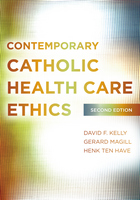
Contemporary Catholic Health Care Ethics, Second Edition, integrates theology, methodology, and practical application into a detailed and practical examination of the bioethical issues that confront students, scholars, and practitioners. Noted bioethicists Gerard Magill, Henk ten Have, and David F. Kelly contribute diverse backgrounds and experience that inform the richness of new material covered in this second edition.
The book is organized into three sections: theology (basic issues underlying Catholic thought), methodology (how Catholic theology approaches moral issues, including birth control), and applications to current issues. New chapters discuss controversial end-of-life issues such as forgoing treatment, killing versus allowing patients to die, ways to handle decisions for incompetent patients, advance directives, and physician-assisted suicide. Unlike anthologies, the coherent text offers a consistent method in order to provide students, scholars, and practitioners with an understanding of ethical dilemmas as well as concrete examples to assist in the difficult decisions they must make on an everyday basis.

How do you build successful professional connections with colleagues from Mexico? While most books focus simply on how to avoid common communication mistakes, this book leads its readers to an understanding of how to succeed and thrive within the three cultures, Mexico, the US, and Canada. Kelm, Hernandez-Pozas and Victor present a set of practical guidelines for communicating professionally with Mexicans, both in Mexico and abroad, providing many photographs as examples. The Seven Keys to Communicating in Mexico follows the model of presenting key cultural concepts used in the earlier books by Kelm and Victor on Brazil and (with Haru Yamada) on Japan. Olivia Hernandez-Pozas, Orlando Kelm, and David Victor, well-respected research professors and seasoned cross-cultural trainers for businesspeople, guide readers through Mexican culture using Victor's LESCANT Model (an acronym representing seven key cross-cultural communication areas: Language, Environment, Social Organization, Contexting, Authority, Nonverbal Behavior, and Time). Each chapter addresses one of these topics and demonstrates how to evaluate the differences among Mexican, US, and Canadian cultures. In the final chapter the authors bring all of these cultural interactions together with a sample case study about business interactions between Mexicans and North Americans. The case study includes additional observations from North American and Mexican business professionals who offer related suggestions and recommendations.
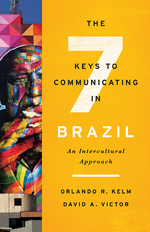
The key to professional success in Brazil is understanding Brazilians. But how do you understand an unfamiliar culture? Seasoned cross-cultural trainers Orlando R. Kelm and David A. Victor use Victor’s groundbreaking approach of evaluating a culture’s language, environment, social organization, context, authority, nonverbal communication, and time conception to provide a framework for understanding Brazilians and show effective strategies to overcome these communication barriers. The method, referred to as the LESCANT approach makes you the expert evaluator of the culture and helps you easily navigate hurdles that can challenge business relationships.
Each chapter of The Seven Keys to Communicating in Brazil employs memorable anecdotes, business cases on each topic from business professionals, and photographs to address key topics. The authors demonstrate how to evaluate the cultural differences between Brazil and North America and include examples of common communication mistakes. Engaging and accessible, the book helps North Americans master the nuances of the Brazilian language and achieve a real experience of the Brasil dos brasileiros.

The Annual, the journal of the Society of Christian Ethics, is an essential source for students and faculty to keep abreast of new developments in Christian and religious ethics and to locate sources for research. The Annual publishes nine to ten refereed scholarly articles a year as well as a professional resources section on teaching and scholarship in ethics. Subjects include the nature and tasks of religious ethics, comparative ethics involving a variety of Western and Eastern traditions, religious social ethics and social theory, and problems in professional and applied ethics.

What is the Arabic term for "suicide bombing"? What phrase would be used to describe "peacekeeping forces" in the Arab media? Or "economic sanctions"?
The Middle East is a key region for politics and business and it is essential that scholars, journalists, government workers, military personnel, businesspeople, and diplomats familiarize themselves quickly with Arabic/English translations for many key words and phrases used in the media. Media Arabic—the language of printed or broadcast news items—emphasizes contemporary terms like "multiculturalism" or "globalization" that are not covered by most Arabic dictionaries.
This practical vocabulary reference provides concise and accessible lists of the most relevant vocabulary, providing key terms for translating from and into Arabic. The Arabic terms are organized by topic and the book now includes an index of English terms to help readers more easily find what they need. These word lists furnish readers with an invaluable knowledge of basic vocabulary used in the media to comprehend, translate, and write Arabic.
NEW! Allow the reader to hear the words, check pronunciation, and test themselves! Audio MP3 files of all vocabulary words in English and Arabic—available as a free download. Simply click on the links below the cover image and download the .zip files.
Topics include:
• General (reports, statements, sources, common media idioms)• Politics & Government• Elections• Military• Economics• Trade & Industry• Law & Order• Disaster & Aid

Honest, objective, and informed political debates are all too rare in today’s polarized and partisan climate. Public policy is increasingly driven by ideology while political spin, distortions, and even demonizing opponents by disseminating outright lies are routine practice from Washington to the local city council. Super-heated and hyper-partisan rhetoric, increasingly homogeneous political and ideological communities, and the public’s spotty knowledge about our political system all undermine informed and considered responses to policy debates.
This book identifies common areas of confusion or misunderstanding about our political system—clarifying many distortions of accepted history, constitutional law, economics, and science—to help readers distinguish documented facts from the different conclusions and interpretations that may be drawn from those facts. Sheila Suess Kennedy aims to create a more informed electorate and to better ground debates in fact, from Capitol Hill to the family dinner table. Talking Politics? What You Need to Know before Opening Your Mouth provides a solid starting point from which Americans can build more persuasive arguments for their preferred policies, whatever they may be, and will interest students of political science, civics, and history, from high school to undergraduates, and the general public interested in politics and informed discussion.

Too often, say its critics, U.S. domestic policy is founded on ideology rather than evidence. Take "Charitable Choice": legislation enacted with the assumption that faith-based organizations can offer the best assistance to the needy at the lowest cost. The Charitable Choice provision of the 1996 Welfare Reform Act—buttressed by President Bush's Faith-Based Initiative of 2000—encouraged religious organizations, including congregations, to bid on government contracts to provide social services. But in neither year was data available to prove or disprove the effectiveness of such an approach.
Charitable Choice at Work fills this gap with a comprehensive look at the evidence for and against faith-based initiatives. Sheila Suess Kennedy and Wolfgang Bielefeld review the movement's historical context along with legal analysis of constitutional concerns including privatization, federalism, and separation of church and state. Using both qualitative and, where possible, statistical data, the authors analyze the performance of job placement programs in three states with a representative range of religious, political, and demographic traits—Massachusetts, Indiana, and North Carolina. Throughout, they focus on measurable outcomes as they compare non-faith-based with faith-based organizations, nonprofits with for-profits, and the logistics of contracting before and after Charitable Choice.
Among their findings: in states where such information is available, the composition of social service contractor pools has changed very little. Reflecting their varied political cultures, states have funded programs differently. Faith-based organizations have not been eager to seek government contracts, perhaps wary of additional legal restraints and reporting burdens.
The authors conclude that faith-based organizations appear no more effective than secular organizations at government-funded social service provision, that there has been no dramatic change in the social welfare landscape since Charitable Choice, and that the constitutional concerns of its detractors may be valid. This empirical study penetrates the fog of the culture wars, moving past controversy over the role of religion in public life to offer pragmatic suggestions for policymakers and organizations who must decide how best to assist the needy.

There is, literally, a world of difference between the statements "Everyone should have adequate food," and "Everyone has the right to adequate food." In George Kent's view, the lofty rhetoric of the first statement will not be fulfilled until we take the second statement seriously. Kent sees hunger as a deeply political problem. Too many people do not have adequate control over local resources and cannot create the circumstances that would allow them to do meaningful, productive work and provide for themselves. The human right to an adequate livelihood, including the human right to adequate food, needs to be implemented worldwide in a systematic way.
Freedom from Want makes it clear that feeding people will not solve the problem of hunger, for feeding programs can only be a short-term treatment of a symptom, not a cure. The real solution lies in empowering the poor. Governments, in particular, must ensure that their people face enabling conditions that allow citizens to provide for themselves.
In a wider sense, Kent brings an understanding of human rights as a universal system, applicable to all nations on a global scale. If, as Kent argues, everyone has a human right to adequate food, it follows that those who can empower the poor have a duty to see that right implemented, and the obligation to be held morally and legally accountable, for seeing that that right is realized for everyone, everywhere.
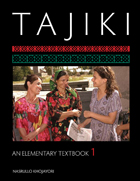
Tajiki, a variety of modern Persian spoken in Central Asia, is the official language of Tajikistan; most speakers of Tajiki live in Tajikistan and Uzbekistan. Volume 1 of Tajiki: An Elementary Textbook is designed to cover the first semester of beginning-level language instruction; together, Volumes 1 and 2 of Tajiki cover one year of instruction. Each volume of Tajiki: An Elementary Textbook uses the latest pedagogical thinking to teach basic communication skills and linguistic forms in their cultural context. Tested in the classroom, Tajiki enhances students' exposure to the language by providing the only authentic video and audio available in Tajiki. Each volume contains a CD-ROM that includes authentic audio and video materials to accompany the text and extra exercises, all in Flash format and all of which are keyed to the textbook. Each book also includes an extensive glossary, maps of the world labeled in Tajiki, and four-color illustrations and photographs throughout.
Topics CoveredVolume One (first semester): Greetings, the Tajiki alphabet, the classroom, professions, introductions, nationalities and places of origin, weather, telling time, family, money, food
Volume Two (second semester): Sports, cooking and ordering meals, clothing, travel, months, seasons, holidays, body parts, medicine, university life, housing (city and village), regions and religions of Tajikistan
Minimum System Requirements
• Intel Pentium II 450 MHz or faster processor (or equivalent); Mac OS 10.4 or higher• 128 MB of RAM• CD Drive• Speakers or headphones
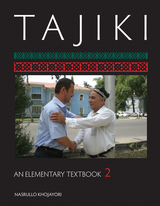
Enhances students’ exposure to the language, providing the only authentic multimedia available in Tajiki
Tajiki, a variety of modern Persian spoken in Central Asia, is the official language of Tajikistan; most speakers of Tajiki live in Tajikistan and Uzbekistan. Volume 2 of Tajiki: An Elementary Textbook is designed to cover the second semester of beginning- or lower-intermediate-level language instruction; together, Volumes 1 and 2 of Tajiki cover one year of instruction. Each volume of Tajiki: An Elementary Textbook uses the latest pedagogical thinking to teach basic communication skills and linguistic forms in their cultural context. Tested in the classroom, Tajiki enhances students’ exposure to the language by providing the only authentic video and audio available in Tajiki.
Each volume includes-Authentic audio and video materials to accompany the text, available for free on GUPTextbooks.com-An extensive glossary-Maps of the world labeled in Tajiki-Color illustrations and photographs throughout
Topics Covered
Volume One (first semester): Greetings, the Tajiki alphabet, the classroom, professions, introductions, nationalities and places of origin, weather, telling time, family, money, food
Volume Two (second semester): Sports, cooking and ordering meals, clothing, travel, months, seasons, holidays, body parts, medicine, university life, housing (city and village), regions and religions of Tajikistan
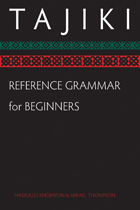
Tajiki Reference Grammar for Beginners features straightforward explanations of Tajiki grammar and pronunciation along with examples of the concepts.
This handy reference grammar is designed for beginning-level language students and—although keyed to both volumes of Tajiki: An Elementary Textbook and a natural resource for students using those textbooks—it is also useful to scholars and students of Central Asian languages and linguistics who wish to learn more about Tajiki.

The latest round of leadership changes at the IMF and the World Bank has generated increasingly intense criticism of the tacit Western hold on governance of these institutions. While this dynamic is indicative of global power adjustments, it also signals a paradigm shift in thought about issues and methodology of development and growth. John Maynard Keynes famously noted the influence economists exert on leaders as: “Practical men, who believe themselves to be quite exempt from any intellectual influence, are usually the slaves of some defunct economist.” Perhaps it is time, especially in the field of development, to question the traditional monopoly of economists, and to effectively include scientists, anthropologists, and others to provide collaborative thought leadership.
The Forum of this issue brings together leading policy makers, business professionals, and academics to evaluate the changing landscape of international development. New forms of assistance and greater connectivity among development stakeholders have reduced relevance of the traditional role of multilateral or bilateral agents of foreign aid and pillar organizations of the Washington Consensus. These bodies must adapt to an ever-changing world while being constrained by laws and bureaucratic processes. There is also a need to balance the perennial temptation of using official development assistance to promote national agenda with the interests of recipients. To deal with these and similar challenges effectively, the future lies in building networks of hybrid partnerships between governments, individuals, and other stakeholders in development.
The Georgetown Journal of International Affairs is the official publication of the Edmund A. Walsh School of Foreign Service at Georgetown University. Each issue of the journal provides readers with a diverse array of timely, peer-reviewed content penned by top policymakers, business leaders, and academic luminaries. The Journal takes a holistic approach to international affairs and features a ‘Forum’ that offers focused analysis on a specific key issue with each new edition of the publication, as well as nine regular sections: Books, Business & Economics, Conflict & Security, Culture & Society, Law & Ethics, A Look Back, Politics & Diplomacy, Science & Technology, and View from the Ground.

Once described by Trygve Lie as the "most impossible job on earth," the position of UN Secretary-General is as frustratingly constrained as it is prestigious. The Secretary-General's ability to influence global affairs often depends on how the international community regards his moral authority. In relation to such moral authority, past office-holders have drawn on their own ethics and religious backgrounds—as diverse as Lutheranism, Catholicism, Buddhism, and Coptic Christianity—to guide the role that they played in addressing the UN's goals in the international arena, such as the maintenance of international peace and security and the promotion of human rights. In The UN Secretary-General and Moral Authority, contributors provide case studies of all seven former secretaries-general, establishing a much-needed comparative survey of each office-holder's personal religious and moral values. From Trygve Lie's forbearance during the UN's turbulent formative years to the Nobel committee's awarding Kofi Annan and the United Nations the prize for peace in 2001, the case studies all follow the same format, first detailing the environmental and experiential factors that forged these men's ethical frameworks, then analyzing how their "inner code" engaged with the duties of office and the global events particular to their terms.
Balanced and unbiased in its approach, this study provides valuable insight into how religious and moral leadership functions in the realm of international relations, and how the promotion of ethical values works to diffuse international tensions and improve the quality of human life around the world.

North Korea is perilously close to developing strategic nuclear weapons capable of hitting the United States and its East Asian allies. Since their first nuclear test in 2006, North Korea has struggled to perfect the required delivery systems. Kim Jong-un’s regime now appears to be close, however. Sung Chull Kim, Michael D. Cohen, and the volume contributors contend that the time to prevent North Korea from achieving this capability is virtually over; scholars and policymakers must turn their attention to how to deter a nuclear North Korea. The United States, South Korea, and Japan must also come to terms with the fact that North Korea will be able to deter them with its nuclear arsenal. How will the erratic Kim Jong-un behave when North Korea develops the capability to hit medium- and long-range targets with nuclear weapons? How will and should the United States, South Korea, Japan, and China respond, and what will this mean for regional stability in the short term and long term? The international group of authors in this volume address these questions and offer a timely analysis of the consequences of an operational North Korean nuclear capability for international security.

A new approach to training and evaluating world languages online instructors
The rapid growth in online world language programs in the United States coupled with the widespread implementation of virtual teaching in response to COVID-19 have pushed the field to reconceive instruction. Virtual learning creates unique challenges for instructors, who need to ensure that their students have adequate interaction with their peers, their professor, and native speakers of the language. Even with a growing demand for online language courses, there are few tools that evaluate the training and assessment of online language instructors.
In Online World Language Instruction Training and Assessment, authors Carmen King Ramírez, Barbara A. Lafford, and James E. Wermers fill that gap, providing a critical pedagogical approach to computer-assisted language learning (CALL) teacher education (CTE). By combining best CTE training and evaluation practices with assessment tools, the authors explain how teachers can integrate technology to build successful online programs. Their ecological, holistic approach addresses all facets of learning online—including pressing challenges of moving courses online, teacher training, developing core competencies and skills, instructions for assessment and self-evaluation, goal setting, and the normalization of critical CTE practices in an increasingly digital environment.
The authors propose new solutions to teacher training challenges, providing extensive rubrics and tools that can equitably assess online language instructor skills, the training they receive, the assessment process they undergo, and the instruments used for instructor assessment. A list of CALL and CTE resources (available on the Press’s website) further supports readers’ successful adaptation to an everchanging learning environment.

In the last three decades the field of endangered and minority languages has evolved rapidly, moving from the initial dire warnings of linguists to a swift increase in the number of organizations, funding programs, and community-based efforts dedicated to documentation, maintenance, and revitalization. Sustaining Linguistic Diversity brings together cutting-edge theoretical and empirical work from leading researchers and practitioners in the field. Together, these contributions provide a state-of-the-art overview of current work in defining, documenting, and developing the world's smaller languages and language varieties.
The book begins by grappling with how we define endangerment—how languages and language varieties are best classified, what the implications of such classifications are, and who should have the final say in making them. The contributors then turn to the documentation and description of endangered languages and focus on best practices, methods and goals in documentation, and on current field reports from around the globe. The latter part of the book analyzes current practices in developing endangered languages and dialects and particular language revitalization efforts and outcomes in specific locations. Concluding with critical calls from leading researchers in the field to consider the human lives at stake, Sustaining Linguistic Diversity reminds scholars, researchers, practitioners, and educators that linguistic diversity can only be sustained in a world where diversity in all its forms is valued.

Advance directives—such as living wills and health care proxies—are documents intended to declare and preserve the health care choices of patients if they become unable to make their own decisions. This book provides a comprehensive overview of advance directives and clear, practical directions for writing and interpreting them.
Nancy M.P. King provides a legal, philosophical, and historical analysis of the moral and legal force of advance directives. She explains the types and models of advance directives currently in use and offers guidelines for individuals seeking to write, read, and use directives to promote individuals' health care choices within the laws of their own states.
King emphasizes that advance directives are not orders given by patients to their doctors; instead, they are documents that invite conversation between doctors and patients about health care decisions of great importance. The purpose of advance directives is to support patients' health care choices, and the book promotes a thoughtful use of advance directives that is best calculated to achieve that purpose, whatever form individual advance directives may take.
This new edition has been updated to reflect the many changes in advance directive statutes since 1991, including expanded discussions of health care proxy statutes, the impact of the Patient Self-Determination Act and the Supreme Court's Cruzan decision. King also has extended her analysis of the implications for advance directives of managed care, resource allocation, resource scarcity, and the debate over futile treatment at the end of life.
Making Sense of Advance Directives is a valuable handbook for patients, health care providers and administrators, patient counselors, lawyers, policymakers, and any individual interested in advance directives.

This book provides an introduction to the main schools of Indian philosophy within both the Hindu and Buddhist traditions. Richard King analyzes the schools' different doctrines and compares their approaches to specific philosophical topics — ontology, epistemology, perception, consciousness, and creation and causality.
While King's main focus is on the ideas as professed by the major schools of thought, he also takes into account the important contributions made by individual thinkers. Among these are Bhartrhari, who helped introduce linguistic analysis into Indian philosophy; Nagarjuna, the reputed founder of the Mahayana or "Middle Way" school; and Asanga, the believed founder of the Yogacara or "Practice of Yoga" school.
This is the first introduction to Indian philosophy written for a western audience to assess Indian thought in its own context and to examine its relationship with the West. King discusses the nature of philosophy in general, examining the shifting usage of the term throughout history. He examines western perceptions of Indian philosophy, exploring the reasons why it has not made substantial inroads into western intellectual discourse.
King argues that western scholars will remain tied to a Eurocentric perspective as long as they continue to ignore the possibility of philosophical thought "East of the Suez." This, he argues, highlights the need for a post-colonial and global approach to philosophy.
Written in a clear and accessible style, the book can be used for courses in religion, theology, and philosophy.

As budgetary concerns have come to dominate Congressional action, the design and implementation of welfare programs have come under greater scrutiny. This book focuses on the food stamp program to examine how the growing integration of welfare and budgeting has affected both politics and people.
Applying insightful analysis to this important policy topic, Ronald F. King looks at the effects on welfare transfers of the kinds of budgetary rules adopted by Congress: discretion, entitlement, and expenditure caps. King uses models based on these forms to interpret the events in the history of the food stamp program up to the welfare reform of 1996, and he shows how these different budget rules have affected political strategies among key actors and policy outcomes.
King analyzes tensions in the program between budgetary concerns and entitlement, revealing that budget mechanisms which seek to cap the growth of entitlement spending have perverse but predictable effects. He also explores the broader conflict between procedural and substantive justice, which pits inclusive democratic decision-making against special protections for the needy and vulnerable in society.
The food stamp program offers a valuable opportunity for studying the influence of shifting institutional factors. In an era when budgetary anxieties coexist with continuing poverty, King's book sheds new light on the increasing fiscalization of welfare in America.
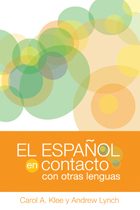
El español en contacto con otras lenguas is the first comprehensive historical, social, and linguistic overview of Spanish in contact with other languages in all of its major contexts—in Spain, the United States, and Latin America. In this significant contribution to the field of Hispanic linguistics, Carol A. Klee and Andrew Lynch explore the historical and social factors that have shaped contact varieties of the Spanish language, synthesizing the principle arguments and theories about language contact, and examining linguistic changes in Spanish phonology, morphology and syntax, and pragmatics.
Individual chapters analyze particular contact situations: in Spain, contact with Basque, Catalan, Valencian, and Galician; in Mexico, Central, and South America, contact with Nahuatl, Maya, Quechua, Aimara, and Guarani; in the Southern Cone, contact with other principle European languages such as Portuguese, Italian, English, German, and Danish; in the United States, contact with English. A separate chapter explores issues of creolization in the Philippines and the Americas and highlights the historical influence of African languages on Spanish, primarily in the Caribbean and Equatorial Guinea.
Written in Spanish, this detailed synthesis of wide-ranging research will be a valuable resource for scholars of Hispanic linguistics, language contact, and sociolinguistics.

Building superior Spanish language proficiency through critical engagement with global challenges
Mastering Spanish through Global Debate is a one-semester textbook designed for students with Advanced-level Spanish language skills, moving toward Superior. Over the course of each chapter, students gain linguistic and rhetorical skills as they prepare to debate on broad, timely topics, including environmental consciousness, immigration, wealth distribution, surveillance and privacy, cultural diversity, and education. Discussion of compelling issues promotes not only linguistic proficiency but social responsibility through critical engagement with complex global challenges.
Each chapter includes topic-specific reading texts and position papers by writers from various Spanish-speaking countries. In addition to pre- and post-reading activities, students benefit from lexical development exercises, rhetorical methods sections, and listening exercises with audio available on the Press website. An online instructor’s manual provides pedagogical recommendations and an answer key.

A love for nature and the forest drew Tomas Koontz to develop a keen interest in the workings of public forest management and forest policy. Beyond policy, however, this book is also about the very human issues of federalism, decentralization of control over public lands, citizen participation, and how agency policies, both state and federal, are formulated and exercised.
Federalism in the Forest is the first book to examine and compare public policy performance across both state and national levels, explaining why state agencies excel at economic outputs and profitability, the management of land with state income in mind-while national agencies are stronger in citizen participation and the inarguably important role of environmental protection. Instead of focusing on historical development of federal-state roles or on state officials as affected by national polices, Koontz shows how officials, when given authority, both make and implement policy at the state versus the national level. Although arguments fly about the decentralization of public lands-most often based on ideology-Koontz offers empirical evidence that demonstrates not only that devolution matters, but how.

The U.S. Foreign Service is sometimes derided, often underappreciated, occasionally praised, rarely examined, and almost never understood. And yet whether America's diplomacy succeeds or fails depends to a large extent on its foreign service professionals. Career Diplomacy is an insider's guide that examines the foreign service as an institution, a profession, and a career.
Harry W. Kopp and Charles A. Gillespie, both of whom had long and distinguished careers in the foreign service, provide a full and well-rounded picture of the organization, its place in history, its strengths and weaknesses, and its role in American foreign affairs. Based on their own experiences and through interviews with over 85 current and former foreign service officials, the authors lay out what to expect in a foreign service career, from the entrance exam through midcareer and into the senior service—how to get in, get around, and get ahead.
The book concludes with a stirring chapter on tomorrow's diplomats and the future of the foreign service as an institution. Readers will benefit from several appendices, which include a Department of State organization chart, core precepts of the foreign service, and internet resources.
Career Diplomacy reveals what America's professional diplomats do and how they do it. It is a rare, first-hand look in to the life and work of this country's professional diplomats, who advance and protect U.S. national security interests around the globe.
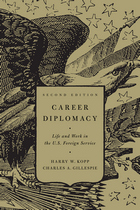
Career Diplomacy—now in its second edition—is an insider's guide that examines the foreign service as an institution, a profession, and a career. Harry W. Kopp and Charles A. Gillespie, both of whom had long and distinguished careers in the foreign service, provide a full and well-rounded picture of the organization, its place in history, its strengths and weaknesses, and its role in American foreign affairs. Based on their own experiences and through interviews with over 100 current and former foreign service officers and specialists, the authors lay out what to expect in a foreign service career, from the entrance exam through midcareer and into the senior service—how the service works on paper, and in practice.
The second edition addresses major changes that have occurred since 2007: the controversial effort to build an expeditionary foreign service to lead the work of stabilization and reconstruction in fragile states; deepening cooperation with the U.S. military and the changing role of the service in Iraq and Afghanistan; the ongoing surge in foreign service recruitment and hiring at the Department of State and U.S. Agency for International Development; and the growing integration of USAID’s budget and mission with those of the Department of State.

Career Diplomacy is an insider's guide to the Foreign Service as an institution, a profession, and a career. In this thoroughly revised third edition, Kopp and Naland provide an up-to-date, authoritative, and candid account of the life and work of professional US diplomats, who advance and protect this country’s national security interests around the globe. The authors explore the five career tracks—consular, political, economic, management, and public diplomacy—through their own experience and through interviews with more than a hundred current and former members of the Foreign Service. They lay out what to expect in a Foreign Service career, from the entrance exam through midcareer and into the senior service—how to get in, get around, and get ahead.
New in the third edition: • A discussion of the relationship of the Foreign Service and the Department of State to other agencies, and to the combatant commands • An expanded analysis of hiring procedures• Commentary on challenging management issues in the Department of State, including the proliferation of political appointments in high-level positions and the difficulties of running an agency with employees in two personnel systems (Civil Service and Foreign Service) • A fresh examination of the changing nature and demographics of the Foreign Service

Despite the growing interest among philosophers and theologians in virtue ethics, its proponents have done little to suggest why Christians in particular find virtue ethics attractive. Joseph J. Kotva, Jr., addresses this question in The Christian Case for Virtue Ethics, showing that virtue theory offers an ethical framework that is highly compatible with Christian morality.
Kotva defines virtue ethics and demonstrates its ability to voice Christian convictions about how to live the moral life. He evaluates virtue theory in light of systematic theology and Scripture, arguing that Christian ethics could be profitably linked with neo-Aristotelian virtue ethics.
Ecumenical in tone, this book provides a thorough but accessible introduction to recent philosophical accounts of virtue and offers an original, explicitly Christian adaptation of these ideas. It will be of value to students and scholars of philosophy, theology, and religion, as well as to those interested in the debates surrounding virtue ethics.

Budgeting has long been considered a rational process using neutral tools of financial management, but this outlook fails to consider the outside influences on leaders’ behavior. Steven G. Koven shows that political culture (moralistic, traditionalistic, individualistic) and ideological orientations (liberal vs. conservative) are at least as important as financial tools in shaping budgets.
Koven examines budget formation at the national, state, and local levels to demonstrate the strong influence of attitudes about how public money should be generated and spent. In addition to statistical data, the book includes recent case studies: the 1997 budget agreement; Governor George W. Bush’s use of the budget process to advance a conservative policy agenda in the state of Texas; and Mayor Marion Barry’s abuses of power in Washington, D.C.
Koven demonstrates that administrative principles are at best an incomplete guide for public officials and that budgeters must learn to interpret signals from the political environment.

Surrogate Warfare explores the emerging phenomenon of “surrogate warfare” in twenty-first century conflict. The popular notion of war is that it is fought en masse by the people of one side versus the other. But the reality today is that both state and non-state actors are increasingly looking to shift the burdens of war to surrogates. Surrogate warfare describes a patron's outsourcing of the strategic, operational, or tactical burdens of warfare, in whole or in part, to human and/or technological substitutes in order to minimize the costs of war. This phenomenon ranges from arming rebel groups, to the use of armed drones, to cyber propaganda. Krieg and Rickli bring old, related practices such as war by mercenary or proxy under this new overarching concept. Apart from analyzing the underlying sociopolitical drivers that trigger patrons to substitute or supplement military action, this book looks at the intrinsic trade-offs between substitutions and control that shapes the relationship between patron and surrogate. Surrogate Warfare will be essential reading for anyone studying contemporary conflict.

Both communitarianism and casuistry have sought to restore ethics as a practical science—the former by incorporating various traditions into a shared definition of the common good, the latter by considering the circumstances of each situation through critical reasoning.
Mark G. Kuczewski analyzes the origins and methods of these two approaches and forges from them a new unified approach. This approach takes the communitarian notion of the person as its starting point but also relies upon the narrative and analogical tools of case-based reasoning. He separates out the rhetoric that is incongruent with the Aristotelian aspirations of each method to show that the two are complementary, and that consensus can emerge from fragmentation.
He then applies his resulting method to three major problems in bioethics: the difficulties that the issue of personal identity poses for advance directives, the role of the family in medical decision making, and the refusal of treatment because of religious beliefs. He analyzes the need to assume a communitarian notion of the person as a starting point for the application of casuistic insights.
Combining theoretical, practical, and scholarly insights, this book will be of interest to philosophers, political and social scientists, and bioethicists.

This collection of thirty-one cases and commentaries addresses ethical problems commonly encountered by the average health care professional, not just those working on such high-tech specialties as organ transplants or genetic engineering. It deals with familiar issues that are rarely considered in ethics casebooks, including such fundamental matters as informed consent, patient decision-making capacity, the role of the family, and end-of-life decisions. It also provides resources for basic but neglected ethical issues involving placement decisions for elderly or technologically dependent patients, rehabilitation care, confidentiality regarding AIDS, professional responsibility, and organizational and institutional ethics.
The authors describe in detail the perspectives of each party to the case, the kind of language that ethicists use to discuss the issues, and the outcome of the case. A short bibliography suggests useful articles for further reading or curriculum development.
Easily understood by readers with no prior training in ethics, this book offers guidance on everyday problems from across the broad continuum of care. It will be valuable for health-care professionals, hospital ethics committees, and for students preparing for careers in health-care professions.

Originally published in 1999, this classic textbook includes twenty-six cases with commentary and bibliographic resources designed especially for medical students and the training of ethics consultants. The majority of the cases reflect the day-to-day moral struggles within the walls of hospitals. As a result, the cases do not focus on esoteric, high-tech dilemmas like genetic engineering or experimental protocols, but rather on fundamental problems that are pervasive in basic healthcare delivery in the United States: where to send a frail, elderly patient who refuses to go to a nursing home, what role the family should play in making a treatment decision, what a hospital should do when it is getting stuck with too many unpaid bills.
This thoroughly revised and updated second edition includes thirteen new cases, five of which are designated as "skill builder" cases aimed specifically at persons who wish to conduct clinical ethics case consultations. The new cases highlight current ethical challenges that arise in caring for populations such as undocumented immigrant patients, persons with substance use disorders involving opioids, and ethical issues that arise beyond the bedside at the organizational level. The reader is invited to use the supplemental videos and assessment tools available on the website of the Loyola University Chicago ACES project (www.LUC.edu/ethicsconsult).
READERS
Browse our collection.
PUBLISHERS
See BiblioVault's publisher services.
STUDENT SERVICES
Files for college accessibility offices.
UChicago Accessibility Resources
home | accessibility | search | about | contact us
BiblioVault ® 2001 - 2024
The University of Chicago Press









